There have been movies about Elvis Presley before, but there’s never been a definitive take on the “King of Rock n’ Roll.” Johnny Cash has Walk the Line, Ray Charles has Ray, but where’s the great Presley biopic?

Elvis Presley: The Searcher, a new two-part documentary now streaming on HBO, is probably a more sensible way to cover Presley’s life and career than a traditional narrative film. Rather than picking over the many details of who he was and what he did for the thousandth time and trying to squeeze a single story out of it, it condenses everything, approaching Presley in a scholarly but streamlined way.
The Searcher comes on the heels of several other HBO docs about American cultural icons, including Arthur Miller: Writer, The Zen Diaries of Garry Shandling, and Andre the Giant. The interesting thing about its recent run is that they are all about famous men who, in one way or another, have been overlooked by contemporary pop culture.
Miller was a public intellectual the likes of which we don’t see any more. Shandling was a comedian so influential people forgot where the style he pioneered came from. Although many would at least recognize Andre the Giant, he remains an icon mostly in professional wrestling circles. And other than Lana Del Rey, when was the last time you saw a millennial who was a huge Presley fan?

And yet, unlike any of the other men HBO has profiled recently, Presley holds a certain cultural cache which only a few artists and entertainers from the last century ever achieved. If anything, he remains seen, if not heard. The popularity of his music may be up for debate, but his status as a staple of Americana remains unchecked. Ask any kid who Presley was, and even if they can’t name one of his songs, they can tell you what he looked like. It’s the very reason we keep waiting for that great biopic about him—he’s too big. No actor has ever adequately been able to fill the King’s blue suede shoes.
So, yeah, The Searcher had a lot to cover. Sure enough, it hits all the points you’d expect: Presley’s upbringing, his discovery of Black music, how he took that music to Sun Records and later to RCA, how he made that music palpable for white teenagers, how he scared the hell out of those teenagers’ parents, how through career ups and downs he could never escape the drug addiction which would eventually take his life. The film also pays special attention his 1968 TV special, using it as a framing device and suggesting that was the moment which forever cemented his legacy as a pioneering television performer. (Presley really did bring the house down with that show.)
Stylistically, The Searcher pieces this information together through a combination of archival footage and voiceover. Director Thom Zimny interviews collaborators like producer Bones Howem, family and friends like wife Priscilla Presley, scholars like history professor William Ferris, contemporaries like Emmylou Harris, and famous fans like Tom Petty and Bruce Springsteen to try and paint a comprehensive picture. Occasionally, he’ll drop in an old interview with people who were important in Presley’s life, like Sun Records founder Sam Phillips or manager “Colonel” Tom Parker. Even a few clips of the King himself help narrate his story. The sheer amount of audio Zimny collected, and how much time he spent collecting it, must be staggering, especially given the haunting snippets featuring the now-deceased Petty.
This artistic choice works for The Searcher. Zimny doesn’t have anything quite as intimate as the home movies Rebecca Miller used of her father for Arthur Miller: Writer, or the journal entries Judd Apatow was given for The Zen Diaries of Garry Shandling. But his choice to go with voiceover in lieu of traditional talking head interviews does give The Searcher a more personalized feel. It’s not quite as extreme as Listen to Me Marlon, Showtime’s documentary on Marlon Brando constructed solely out of archival footage and audio recordings of Brando himself. However, the use of these disembodied voices does help give the impression that Zimny’s subjects are talking right to you.
Despite all the various perspectives we get on Presley here, all the countless hours Zimny obviously spent collecting stories, I still didn’t come away feeling like I knew much about the man. There’s a line in Ezra Edelman’s fantastic O.J. Simpson documentary, O.J.: Made in America, where one of the interview subjects says, “The story isn’t O.J., the story is O.J. and us.” This same principle can be applied to The Searcher. The documentary isn’t so much about Presley, but about the people in his life—how they related and felt toward him.

The film does provide some interesting details. It explores Presley’s close relationship with his mother, for instance, as well as his exploitative partnership with Colonel Parker (a man so fascinating he warrants his own documentary). I also had no idea how seriously Presley took acting, how he wanted to be seen as a James Deen or Marlon Brando, to be perceived as more than just a teen heartthrob. I didn’t know that he picked up his pill habit not in the music business, but in the military, where he would take drugs to stay up all night on watch.
What The Searcher covers exhaustingly is Presley’s music. If you’re someone who appreciates discussions of craft, about how the twang of a guitar, the slap of a bass, or the beat of a drum can change a whole culture, then there’s a lot here you’ll love. However, the film dances around the question of cultural appropriation, something which will always be central to Presley’s legacy. It is discussed whether Sam Phillips was looking for a white musician who could bring Black music to the masses, or whether Presley was looking for a producer to help him do the same.
The way he pulled together elements of “Black music” like R&B and “white music” like country to write rock that could cross color lines is indisputable. But there’s something unexplored in The Searcher about how he exploited the music he worshipped.
There’s not a lot of recontextualization going on in The Searcher. The film is full of facts, but none of them are showcased in a new light. Luckily most of the music speaks for itself.
Still not sure what to watch on HBO? Here are the best movies on HBO, the best HBO documentaries, and what’s new on HBO Go this month.


